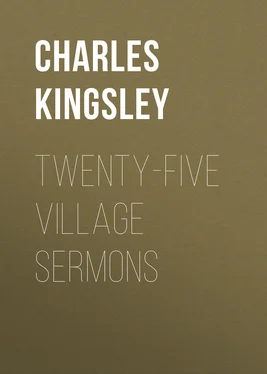Charles Kingsley - Twenty-Five Village Sermons
Здесь есть возможность читать онлайн «Charles Kingsley - Twenty-Five Village Sermons» — ознакомительный отрывок электронной книги совершенно бесплатно, а после прочтения отрывка купить полную версию. В некоторых случаях можно слушать аудио, скачать через торрент в формате fb2 и присутствует краткое содержание. Жанр: foreign_prose, foreign_religion, Философия, foreign_psychology, foreign_antique, на английском языке. Описание произведения, (предисловие) а так же отзывы посетителей доступны на портале библиотеки ЛибКат.
- Название:Twenty-Five Village Sermons
- Автор:
- Жанр:
- Год:неизвестен
- ISBN:нет данных
- Рейтинг книги:4 / 5. Голосов: 1
-
Избранное:Добавить в избранное
- Отзывы:
-
Ваша оценка:
- 80
- 1
- 2
- 3
- 4
- 5
Twenty-Five Village Sermons: краткое содержание, описание и аннотация
Предлагаем к чтению аннотацию, описание, краткое содержание или предисловие (зависит от того, что написал сам автор книги «Twenty-Five Village Sermons»). Если вы не нашли необходимую информацию о книге — напишите в комментариях, мы постараемся отыскать её.
Twenty-Five Village Sermons — читать онлайн ознакомительный отрывок
Ниже представлен текст книги, разбитый по страницам. Система сохранения места последней прочитанной страницы, позволяет с удобством читать онлайн бесплатно книгу «Twenty-Five Village Sermons», без необходимости каждый раз заново искать на чём Вы остановились. Поставьте закладку, и сможете в любой момент перейти на страницу, на которой закончили чтение.
Интервал:
Закладка:
And how does he die? The text tells us, God takes away his breath, and turns His face from him. In His presence, it is written, is life. The moment He withdraws his Spirit, the Spirit of life, from any thing, body or soul, then it dies. It was by sin came death—by man’s becoming unfit for the Spirit of God.
Therefore the body is dead because of sin, says St. Paul, doomed to die, carrying about in it the seeds of death from the very moment it is born. Death has truly passed upon all men!
Most sad; and yet there is hope, and more than hope, there is certain assurance, for us, that though we die, yet shall we live! I have shewn you, in the beginning of my sermon, how nothing that dies perishes to nothing, but begins a new and a higher life. How the stone becomes a plant,—something better and more useful than it was before; the plant passes into an animal—a step higher still. And, therefore, we may be sure that the same rule will hold good about us men and women, that when we die, we shall begin a new and a nobler life, that is, if we have been true men ; if we have lived fulfilling the law of our kind. St. Paul tells us so positively. He says that nothing comes to life except it first die, then God gives it a new body. He says that even so is the resurrection of the dead,—that we gain a step by dying; that we are sown in corruption, and are raised in incorruption; we are sown in dishonour, and are raised in glory; we are sown in weakness, and are raised in power; we are sown a natural body, and are raised a spiritual body; that as we now are of the earth earthy, after death and the resurrection our new and nobler body will be of the heavens heavenly; so that “when this corruptible shall have put on incorruption, and this mortal shall have put on immortality, then death shall be swallowed up in victory.” Therefore, I say, Sorrow not for those who sleep as if you had no hope for the dead; for “Christ is risen from the dead, and become the first-fruits of them that slept. For as in Adam all die, even so in Christ shall all be made alive.”
And I say that this has to do with the text—it has to do with Ascension-day. For if we claim our share in Christ,—if we claim our share of our heavenly Father’s promise, “to give the Holy Spirit to those who ask Him;” then we may certainly hope for our share in Christ’s resurrection, our share in Christ’s ascension. For, says St. Paul (Rom. viii. 10, 11), “if Christ be in you, the body is dead because of sin, but the Spirit is life because of righteousness. But if the Spirit of Him who raised up Jesus from the dead dwell in you, He that raised up Christ from the dead shall also quicken your mortal bodies, by His Spirit that dwelleth in you!” There is a blessed promise! that in that, as in every thing, we shall be made like Christ our Master, the new Adam, who is a life-giving Spirit, that as He was brought to life again by the Spirit of God, so we shall be. And so will be fulfilled in us the glorious rule which the text lays down, “Thou, O God, sendest forth Thy Spirit, and they are created, and Thou dost renew the face of the earth.” Fulfilled?—yes, but far more gloriously than ever the old Psalmist expected. Read the Revelations of St. John, chapters xxi. and xxii. for the glory of the renewed earth read the first Epistle of Paul to the Thessalonians, chap. iv. 16–18, for the glorious resurrection and ascension of those who have died trusting in the blessed Lord, who died for them; and then see what a glorious future lies before us—see how death is but the gate of life—see how what holds true of every thing on this earth, down to the flint beneath our feet, holds true ten thousand times of men that to die and to decay is only to pass into a nobler state of life. But remember, that just as we are better than the stone, we may be also worse than the stone. It cannot disobey God’s laws, therefore it can enjoy no reward, any more than suffer any punishment. We can disobey—we can fall from our calling—we can cast God’s law behind us—we can refuse to do His will, to work out our own salvation; and just because our reward in the life to come will be so glorious, if we fulfil our life and law, the life of faith and the law of love, therefore will our punishment be so horrible, if we neglect the life of faith and trample under foot the law of love. Oh, my friends, choose! Death is before you all. Shall it be the gate of everlasting life and glory, or the gate of everlasting death and misery? Will you claim your glorious inheritance, and be for ever equal to the angels, doing God’s will on earth as they in heaven; or will you fall lower than the stones, who, at all events, must do their duty as stones, and not do God’s will at all, but only suffer it in eternal woe? You must do one or the other. You cannot be like the stones, without feeling—without joy or sorrow, just because you are immortal spirits, every one of you. You must be either happy or miserable, blessed or disgraced, for ever. I know of no middle path;—do you? Choose before the night comes, in which no man can work. Our life is but a vapour which appears for a little time, then vanishes away. “O Lord, how manifold are Thy works! in wisdom hast Thou made them all: the earth is full of Thy riches. That Thou givest them they gather: Thou openest Thine hand, they are filled with good. Thou hidest Thy face, they are troubled: Thou takest away their breath, they die, and return to their dust. Thou sendest forth Thy Spirit, they are created: and Thou renewest the face of the earth.”
SERMON IV
THE WORK OF GOD’S SPIRIT
“Do not err, my beloved brethren; every good gift and every perfect gift is from above, and cometh down from the Father of lights.”
This text, I believe more and more every day, is one of the most important ones in the whole Bible; and just at this time it is more important for us than ever, because people have forgotten it more than ever.
And, according as you firmly believe this text, according as you firmly believe that every good gift you have in body and soul comes down from above, from God the Father of lights—according, I say, as you believe this, and live upon that belief, just so far will you be able to do your duty to God and man, worthily of your blessed Saviour’s calling and redemption, and of the high honour which He has given you of being free and christened men, redeemed by His most precious blood, and led by His most noble Spirit.
Now, just because this text is so important, the devil is particularly busy in trying to make people forget it. For what is his plan? Is it not to make us forget God, to put God out of all our thoughts, to make us acknowledge God in none of our ways, to make us look at ourselves and not at God, that so we may become first earthly and sensual, and then devilish, like Satan himself? Therefore he tries to make us disbelieve this text. He puts into our hearts such thoughts as these:—‘Ay, all good gifts may come from God; but that only means all spiritual gifts. All those fine, deep doctrines and wonderful feelings that some very religious people talk of, about conversion, and regeneration, and sanctification, and assurance, and the witness of the indwelling Spirit,—all those gifts come from God, no doubt, but they are quite above us. We are straightforward, simple people, who cannot feel fine fancies; if we can be honest, and industrious, and good-natured, and sober, and strong, and healthy, that is enough for us,—and all that has nothing to do with religion. Those are not gifts which come from God. A man is strong and healthy by birth, and honest and good-natured by nature. Those are very good things; but they are not gifts—they are not graces —they are not spiritual blessings—they have nothing to do with the state of a man’s soul. Ungodly people are honest, and good-tempered, and industrious, and healthy, as well as your saints and your methodists; so what is the use of praying for spiritual gifts to God, when we can have all we want by nature?’
Читать дальшеИнтервал:
Закладка:
Похожие книги на «Twenty-Five Village Sermons»
Представляем Вашему вниманию похожие книги на «Twenty-Five Village Sermons» списком для выбора. Мы отобрали схожую по названию и смыслу литературу в надежде предоставить читателям больше вариантов отыскать новые, интересные, ещё непрочитанные произведения.
Обсуждение, отзывы о книге «Twenty-Five Village Sermons» и просто собственные мнения читателей. Оставьте ваши комментарии, напишите, что Вы думаете о произведении, его смысле или главных героях. Укажите что конкретно понравилось, а что нет, и почему Вы так считаете.












